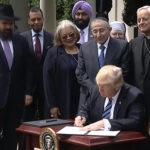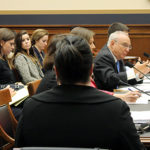WASHINGTON—President Donald Trump signed an executive order Jan. 27 that temporarily halts the refugee resettlement program and suspends visas from several Muslim-majority countries, drawing immediate reaction from religious leaders.
The measure blocks visa applicants from Iraq, Iran, Libya, Somalia, Sudan and Yemen until what Trump called an “extreme vetting” process is implemented, and it indefinitely bars refugees from Syria.
The ban on refugee resettlement includes a narrow exception for individuals who face religious persecution and are members of religious minority groups in their countries of origin.
‘Back-door bar on Muslim refugees’
“Today’s action is a back-door bar on Muslim refugees, telling an entire faith group that they are not welcome on our shores,” said Amanda Tyler, executive director of the Baptist Joint Committee for Religious Liberty. “Any attempt to ban Muslim refugees based on their religion betrays our values and sends the un-American message that there are second-class faiths.
“Our country, founded by immigrants who established religious freedom as a bedrock principle, is better than this. A threat to anyone’s religious liberty is a threat to everyone’s religious liberty, and we as Baptists stand with those facing religious persecution around the world, regardless of their faith.”
John McCullough, president of Church World Service, called the executive action “not only morally reprehensible but entirely misguided, downright dangerous and in direct opposition to the values we espouse as a nation.”
“Make no mistake––by restricting access to resettlement for refugees from Syria and other countries and simultaneously preferencing religious minorities, President Trump is manifesting the ‘Muslim ban’ that he threatened on the campaign trail,” he said. “This is a clear case of religious discrimination and must be decried as such.”
David Bernstein, president of the Jewish Council for Public Affairs criticized Trump for “the callous decision to take such action on International Holocaust Remembrance Day.”
Sign up for our weekly edition and get all our headlines in your inbox on Thursdays
“These pronouncements not only severely restrict immigration; they instill fear among existing immigrant populations that they are not welcome and may be at risk,” Bernstein, said.
Cheryl Fishbein, chair of the Jewish Council for Public Affairs, added, “As the daughter of refugees, I take this very personally.”
The United States already has “one of the most stringent vetting policies in the world,” and the process already in place serves the nation well, she noted.
“We are facing a severe international refugee crisis and cannot let our concerns about radical Islam undermine a core national purpose—providing a home for immigrants,” Fishbein said. “The American immigrant experience is one of the country’s greatest sources of strength.”
Religious leaders react to early draft of order
The Los Angeles Times posted a draft copy of the order Jan. 25 that suspends the U.S. Refugee Admission Program for 120 days. Even before Trump signed the order, religious leaders responded to that document.
“Christians and churches have been welcoming refugees for 2,000 years, and evangelicals are committed to continue this biblical mission,” said Leith Anderson, president of the National Association of Evangelicals. “Thousands of U.S. evangelicals and their churches have welcomed hundreds of thousands of refugees over the past 40 years through World Relief and other federally approved resettlement agencies. We don’t want to stop now.”
Jack Moline, president of the Interfaith Alliance, called the executive order “a de facto Muslim ban.”
“The United States has long prided itself as a safe bastion for refugees around the globe facing persecution and strife,” Moline said. “President Trump is poised to trample upon that great legacy in one of his first major acts in office.”
Jonah Pesner, director of the Union for Reform Judaism’s Religious Action Center, cited the exodus experience of the Hebrews who left bondage in ancient Egypt.
“Our Scripture teaches us we should treat the stranger among us as if he or she were native born, because we were strangers in the land of Egypt,” he said. “If they target Muslims, they target Christians and Jews, as well. We stand together.”
‘Not a biblical command’
However, evangelist Franklin Graham, president of Samaritan’s Purse, told the Huffington Post the United States must improve its vetting process and be cautious in its immigration policies.
“It’s not a biblical command for the country to let everyone in who wants to come; that’s not a biblical issue,” he said. “We want to love people. We want to be kind to people. We want to be considerate. But we have a country, and a country should have order, and there are laws that relate to immigration, and I think we should follow those laws. Because of the dangers we see today in this world, we need to be very careful.”
Likewise, the American Center for Law and Justice posted an article on its website that stated: “While Scripture clearly supports caring for the victims of genocide and taking in refugees, it does not require the blind acceptance of all comers. Letting the wolves in with the sheep is clearly not a Christian principle.”
















We seek to connect God’s story and God’s people around the world. To learn more about God’s story, click here.
Send comments and feedback to Eric Black, our editor. For comments to be published, please specify “letter to the editor.” Maximum length for publication is 300 words.